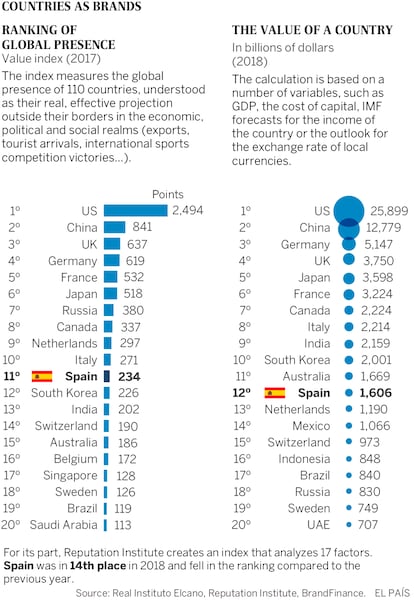Spain: near the top in global brand value, but low in self-esteem
Reports consistently place the country in high spots for institutional, economic and social development, yet Spaniards tend to focus on the negative aspects of their country

A tremendous recession, three elections in the last four years, an independence drive by part of the population in Catalonia, countless cases of political and business corruption... Spain’s reputation has been through some very tough times in the last 20 years, yet it is solid enough that little has changed in the eyes of the outside world.
What’s very important to us is experienced with great intensity and drama at home, while it gets very limited attention outside our borders
Carmen González, Elcano Institute
Reports by the Elcano Institute, Brand Finance and Reputation Institute based on surveys and indexes built on quantitative measurements (such as GDP, exports, borrowing costs, investment, tourist arrivals, and so on) all place Spain within the world’s top-20 countries in terms of institutional, social and development levels.
In its 2018 report on the world’s most valuable nation brands, the global business valuation consultancy Brand Finance ranked Spain 12th with a value of $1.6 billion.

In July of last year, The Economist ran a story exploring the Catalan crisis that was titled: “Can Spain become a normal European country?” The answer was: “There are few better places to live, but still plenty of problems to solve.”
“A country’s prestige is built slowly over the course of centuries. Spain, unlike other relatively new states that have not managed to distance themselves from their neighboring countries, projects a clear image and that is a great advantage,” says Carmen González, director of the Spain Image Observatory at Elcano Institute. This think tank has been analyzing Spain’s international projection for years, and the most recent low point came during the economic crisis, says González.

This institution says that Spain’s international image has improved since then, but that there is one remarkable thing going on: Spaniards’ own vision of the country is worse than its outside perception. And that is something that only happened in five of the 20 or so countries that were analyzed by Elcano: Spain, Japan, Italy, South Africa and Brazil.
“There were times when the difference was quite significant. In 2014 the domestic score was 5.2 on 10 and the external one was 6.7,” says González. “This is because what’s very important to us, such as corruption or the Catalan issue, is experienced with great intensity and drama at home, while it gets very limited attention outside our borders.”
It is a similar story with political events that typically make business leaders tear out their hair. “When new parties emerged, such as Podemos and Ciudadanos, the media devoted a lot of attention to them, but by 2016 they’d become a normal part of the political scene. Now [far-right group] Vox is in the spotlight because it is new, but the same thing will happen.”
The battle over image is not just being fought at the national level. Big cities also vie with each other to defend their share of global attention and benefit their business fabric.
Pau Guardans, president of the hotel chain Único Hotels and head of the association Barcelona Global, believes that not so long from now “150 cities will move the world.”
Guardans believes that Barcelona will be one of those hubs. “This is not about flags or political battles. We have a lot more in common than what divides us,” he says, asking for a tax system that will attract top workers. “In Paris and Lisbon, they have tailor-made plans to repatriate and attract talent. Why not us?”
In Paris and Lisbon, they have tailor-made plans to repatriate and attract talent. Why not us?
Pau Guardans, Barcelona Global
Miguel Mayorga, an urban architect who teaches at the Polytechnic University of Catalonia, notes that modern competition between cities began in the 19th century and resulted in the notion of “cities as a product.” In the mid-20th century, cities began to be viewed as global economic hubs. “What’s going on now is that the concept of ‘smart city’ has become a differentiating element,” says Mayorga, noting that no city can maintain a good reputation in every field, but that finding a balanced model will define its strength.
English version by Susana Urra.
Tu suscripción se está usando en otro dispositivo
¿Quieres añadir otro usuario a tu suscripción?
Si continúas leyendo en este dispositivo, no se podrá leer en el otro.
FlechaTu suscripción se está usando en otro dispositivo y solo puedes acceder a EL PAÍS desde un dispositivo a la vez.
Si quieres compartir tu cuenta, cambia tu suscripción a la modalidad Premium, así podrás añadir otro usuario. Cada uno accederá con su propia cuenta de email, lo que os permitirá personalizar vuestra experiencia en EL PAÍS.
¿Tienes una suscripción de empresa? Accede aquí para contratar más cuentas.
En el caso de no saber quién está usando tu cuenta, te recomendamos cambiar tu contraseña aquí.
Si decides continuar compartiendo tu cuenta, este mensaje se mostrará en tu dispositivo y en el de la otra persona que está usando tu cuenta de forma indefinida, afectando a tu experiencia de lectura. Puedes consultar aquí los términos y condiciones de la suscripción digital.









































